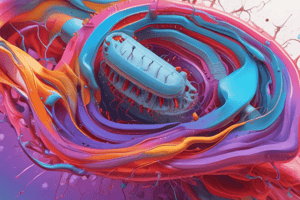Podcast
Questions and Answers
What is shock?
What is shock?
Shock is an abnormal state associated with hypoperfusion.
What is hypoperfusion?
What is hypoperfusion?
Inadequate oxygen supply, inadequate nutrient delivery to cells, and inadequate removal of waste products.
When does hypoperfusion occur?
When does hypoperfusion occur?
When the level of tissue perfusion decreases below normal.
What are the three stages of shock?
What are the three stages of shock?
What characterizes stage 1 compensated shock?
What characterizes stage 1 compensated shock?
What are other signs of hypoperfusion?
What are other signs of hypoperfusion?
What happens in stage 2 decompensated shock?
What happens in stage 2 decompensated shock?
What occurs in stage 3 irreversible shock?
What occurs in stage 3 irreversible shock?
What is hypovolemic shock and how is it categorized?
What is hypovolemic shock and how is it categorized?
Define cardiogenic shock.
Define cardiogenic shock.
What does arrhythmia mean?
What does arrhythmia mean?
What is vasogenic shock?
What is vasogenic shock?
What is anaphylactic shock?
What is anaphylactic shock?
What are typical signs and symptoms of anaphylactic shock?
What are typical signs and symptoms of anaphylactic shock?
Define septic shock.
Define septic shock.
What causes neurogenic shock?
What causes neurogenic shock?
What does the term associated hypotension imply?
What does the term associated hypotension imply?
What are signs of hypovolemia?
What are signs of hypovolemia?
What are the signs of vasogenic shock?
What are the signs of vasogenic shock?
What are the causes of hypovolemia?
What are the causes of hypovolemia?
What are the causes of cardiogenic shock?
What are the causes of cardiogenic shock?
What causes vasogenic shock?
What causes vasogenic shock?
What causes anaphylactic shock?
What causes anaphylactic shock?
What causes septic shock?
What causes septic shock?
Flashcards are hidden until you start studying
Study Notes
Definition of Shock
- Shock is an abnormal state marked by hypoperfusion, leading to inadequate blood flow to tissues.
Hypoperfusion Explained
- Inadequate oxygen supply and nutrient delivery to cells.
- Inability to remove waste from cellular metabolism.
- Requires a functioning heart to maintain circulation.
Occurrence of Hypoperfusion
- Happens when tissue perfusion levels drop below normal.
Stages of Shock
- Compensated or non-compensated: Early signs of shock.
- Decompensated or progressive: Late signs requiring immediate intervention.
- Irreversible: Terminal stage, leading to death.
Stage 1: Compensated Shock
- Body attempts to counteract volume loss through physiological mechanisms.
- Fluid replacement can aid compensatory processes and protect major organs from damage.
Signs of Hypoperfusion
- Dusky or mottled skin appearance.
- Oliguria (reduced urine output).
- Impaired mental status or confusion.
Stage 2: Decompensated Shock
- Prolonged hypoperfusion increases myocardial oxygen demand.
- Compensatory mechanisms fail, leading to decreased cardiac output and tissue perfusion.
- Symptoms include weak or absent peripheral pulses and potential fluid leakage causing edema.
Stage 3: Irreversible Shock
- Progressive heart decline and kidney failure.
- Widespread cellular death in tissues and organs.
- Final outcome typically results in patient death.
Types of Shock - Hypovolemic
- Exogenous: Results from external bleeding or fluid loss (e.g., trauma, diarrhea).
- Endogenous: Fluid loss occurs internally, within the body.
Types of Shock - Cardiogenic
- Heart’s inability to circulate adequate blood, resulting in insufficient oxygen delivery to tissues.
Basic Definition of Arrhythmia
- Abnormal or irregular heartbeat patterns.
Types of Shock - Obstructive
- A form of cardiogenic shock involving obstruction to blood flow in the heart or major vessels.
Types of Shock - Vasogenic (Distributive)
- Shock due to blood vessel dilation, leading to abnormal blood redistribution within the vascular system.
Anaphylactic Shock
- Severe, life-threatening allergic reaction triggered by substances such as latex, certain foods, or medication.
- Rapid onset with symptoms including low blood pressure, airway obstruction, and severe hypoxia.
Signs and Symptoms of Anaphylactic Shock
- Skin: Itching, hives, warmth.
- Cardiovascular: Hypotension.
- CNS: Anxiety, dizziness, loss of consciousness.
Septic Shock
- Results from widespread infection, commonly bacterial, with a mortality rate around 29%.
Neurogenic Shock
- Sudden loss of sympathetic autonomic tone due to spinal cord injury.
Associated Hypotension Risks
- Increases risk of secondary spinal cord ischemia due to impaired blood flow regulation.
Signs of Hypovolemic Shock
- Elevated heart rate (tachycardia).
- Low blood pressure (hypotension).
- Cold, clammy skin with delayed capillary refill.
Signs of Vasogenic Shock
- Increased heart rate; may be normal in neurogenic shock.
- Low blood pressure.
- Warm skin, with possible coldness in severe cases.
Signs of Cardiogenic Shock
- Heart rate can be increased or decreased.
- Low blood pressure.
- Cold, clammy skin and slow capillary refill.
Causes of Hypovolemic Shock
- Significant loss of blood or plasma volume.
Causes of Cardiogenic Shock
- Diminished pumping capability of the heart.
Causes of Vasogenic Shock
- Vasodilation due to loss of sympathetic tone, triggered by pain, fear, or spinal cord injuries.
Causes of Anaphylactic Shock
- Systemic vasodilation and increased vascular permeability due to severe allergic reactions.
Causes of Septic Shock
- Severe infection leading to vasodilation, often associated with gram-negative bacteria.
Studying That Suits You
Use AI to generate personalized quizzes and flashcards to suit your learning preferences.




